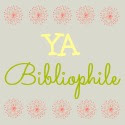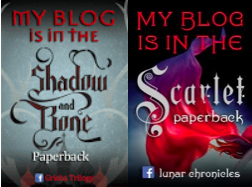Hello lovely readers! I have a treat for you today. Sarah Beth Durst was gracious enough to answer some questions for me. Her newest book Vessel was released last week and it is fabulous! Check out my review.

In a desert world of sandstorms and sand-wolves, a teen girl must defy the gods to save her tribe in this mystical, atmospheric tale from the author of Drink, Slay, Love.Liyana has trained her entire life to be the vessel of a goddess. The goddess will inhabit Liyana’s body and use magic to bring rain to the desert. But Liyana’s goddess never comes. Abandoned by her angry tribe, Liyana expects to die in the desert. Until a boy walks out of the dust in search of her.
Korbyn is a god inside his vessel, and a trickster god at that. He tells Liyana that five other gods are missing, and they set off across the desert in search of the other vessels. For the desert tribes cannot survive without the magic of their gods. But the journey is dangerous, even with a god’s help. And not everyone is willing to believe the trickster god’s tale.
The closer she grows to Korbyn, the less Liyana wants to disappear to make way for her goddess. But she has no choice: She must die for her tribe to live. Unless a trickster god can help her to trick fate—or a human girl can muster some magic of her own.
Looks amazing, yes?
Check out what Sarah had to say about Vessel, tricksters, and writing in general…
YA Bibliophile: I’ve always been interested in stories that deal with the interactions between humans and their gods and goddesses. In Vessel this interaction is different than any other story I’ve read. Where did the idea of a literal vessel come from? Did you look at any specific mythoi in writing your gods and goddesses?
Sarah Beth Durst: I’d been toying with the concept of a person with extraordinary power that comes at an extraordinary price, and I had the idea of a girl possessed by a goddess… but in order for this possession to occur, the girl’s soul would have to leave. In other words, she’d have to die.
I adore mythology, and I read tons of it. For the world of VESSEL, I tried to create the feel of a rich storytelling tradition by drawing on archetypal themes. The resulting stories are unique to Liyana’s world but (I hope!) have a universal weight to them.
The one archetype that I did deliberately include was the trickster god, a figure that appears in many cultures. My trickster Korbyn walks out of a sandstorm to save Liyana — and she threatens to skewer him.
YAB: I love Vessel’s first sentence. As Kirkus said it’s a gripping first line. In the overall writing of Vessel where does that line come in? Did you have it down from the get go or go back and change it? In your opinion, how important are first lines?
SBD: For me, the first line is key to unlocking the rest of the story. Once I have it, I can move forward. I had the first paragraph to VESSEL before I even knew who Liyana was or what her journey would be:
On the day she was to die, Liyana walked out of her family’s tent to see the dawn. She buried her toes in the sand, cold from the night, and she wrapped her father’s goatskin cloak tight around her shoulders. She had only moments before everyone would wake.
YAB: Vessel will be your sixth published book. Was your writing process similar for all of the books? Has it changed much since your first published book?
SBD: Yes, it’s changed as I’ve figured out what works for me and what doesn’t. For example, in the beginning, I didn’t outline. For some, not outlining works great. But for me… well, I’m easily distracted by shiny things. Outlining keeps me on course and saves me from skipping blithely after the White Rabbit when there are no bunnies in the story at all.
YAB: If you could have a conversation with any author, living or dead, who would you want to talk with?
SBD: Jane Austen. I’d love to thank her for writing such wonderful books and tell her how many people still love them. Plus, I bet she’d be tremendously entertaining to talk to.
YAB: Your books span a variety of settings and topics. You’ve got vampires, fairy tale retellings, magical realms, Ivy League schools, the Arctic and now desert tribes and gods and goddesses. Are your reading tastes as varied? What kinds of books attract you?
SBD: I love fantasy. It can have vampires, petticoats, light sabers, or whatever, but the kind of books I love best are the ones that take you on a journey and bring you back feeling as if the world is a little more magical and wondrous than it felt before.
YAB: In reading what your website says about Vessel I was super excited to see that a trickster god is involved. Many of my favorite myths from around the world are trickster stories. Why did you choose to make Korbyn a trickster? Do you have a favorite “type” of god/goddess?
SBD: I’ve always loved the trickster. He’s my favorite archetype because he is so often the catalyst. He doesn’t merely react; he creates events. He creates stories. In a way, all writers are tricksters.
YAB: The bio on your website notes that you wanted to be a writer since childhood. What’s the best part about getting to live that dream?
SBD: Getting to write the next novel!!!
YAB: What does your ideal day look like?
SBD: It starts with a lot of writing, includes a few tasty meals, and concludes with time with my family. Toss in a dragon ride, and that’s a perfect day!
YAB: Have any of your characters been easier to write than others? Do you prefer to write a certain kind of character?
SBD: Easiest was Pearl, my vampire girl from DRINK, SLAY, LOVE. To write her, I’d simply imagine what I wouldn’t do or say in a given situation. Seriously, writing a full-of-snark evil character is immensely fun.
In general, I love to write strong characters, particularly strong female protagonists. Liyana, for example, is both brave and practical, willing to sacrifice herself to save her family, even though she doesn’t want to die.
YAB: What is it about writing books for teens that appeals to you?
SBD: Actually, I try not to think about the audience or the market as I write. I just try to write what I want to read. The best writing advice I know is: don’t write what you know; write what you love!
Thanks so much for interviewing me!
Thank you to Sarah for answering my questions! I loved learning more about where the ideas for Liyana and her world came from. If you’re a fan of fantasy or mythology I highly recommend Vessel!
 Sarah Beth Durst is the author of young adult novels Vessel, Drink, Slay, Love,Enchanted Ivy, and Ice, as well as middle grade novels Into the Wild and Out of the Wild. She has twice been a finalist for SFWA’s Andre Norton Award, for both Ice and Into the Wild. Sarah lives in Stony Brook, New York, with her husband and children. Visit her at sarahbethdurst.com.
Sarah Beth Durst is the author of young adult novels Vessel, Drink, Slay, Love,Enchanted Ivy, and Ice, as well as middle grade novels Into the Wild and Out of the Wild. She has twice been a finalist for SFWA’s Andre Norton Award, for both Ice and Into the Wild. Sarah lives in Stony Brook, New York, with her husband and children. Visit her at sarahbethdurst.com.
Sarah Beth Durst is the author of young adult novels Vessel, Drink, Slay, Love,Enchanted Ivy, and Ice, as well as middle grade novels Into the Wild and Out of the Wild. She has twice been a finalist for SFWA’s Andre Norton Award, for both Ice and Into the Wild. Sarah lives in Stony Brook, New York, with her husband and children. Visit her at sarahbethdurst.com.












Leave a Reply